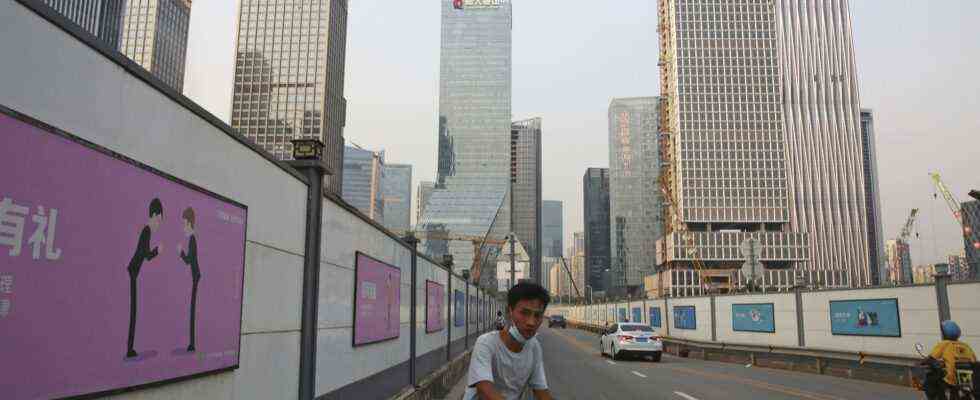Status: 09.12.2021 3:38 p.m.
The Chinese real estate company Evergrande is so indebted that rating agencies are warning of an imminent default. No help can be expected from the Chinese government.
For weeks, the shaky Chinese real estate company Evergrande has been causing unrest in the financial markets – especially in Hong Kong, where the share is listed. Now the problems of the company with allegedly over 300 billion dollars in debt have apparently come to a head that rating agencies are warning of an imminent default. This also applies to the competitor Kaisa. The Fitch agency put both companies on the “Restricted Default (RD)” level in the morning – that means something like “restricted credit default”. The rating is only one level above the classification for payment default (“D – Default”). Yesterday, the rating agency Standard & Poor’s described a payment default by Evergrande as “unavoidable”.
The experts thus confirmed reports from the beginning of the week that Evergrande had apparently not paid interest payments due on November 6, even after the 30-day waiting period had expired on Monday. It is an obligation to pay $ 82.5 million in interest on foreign bonds.
“Neither the company nor the trustee have commented on the coupon payments due on November 6 for the two Tianji bonds after the grace periods have expired,” Fitch said in a statement.
Rival Kaisa has initiated debt restructuring
The smaller Evergrande rival Kaisa Group, which has also defaulted and was downgraded to “RD” by Fitch, has initiated a debt restructuring. Management will shortly reach a confidentiality agreement with investment bank Lazard advising a group of bondholders. This will lay the foundation for negotiations on refinancing and loan deferrals. Kaisa says it has foreign bonds outstanding to the tune of $ 12 billion. Evergrande’s $ 19 billion.
In comparison to the sums burned in the 2007/08 financial crisis, these are rather manageable amounts, so that the reactions on the stock exchanges have so far been limited. However, the consequences of the Chinese real estate crisis on the overall economy are still unclear.
In view of the importance of the real estate market and the industries associated with it for the Chinese economy – around a quarter of the country’s gross domestic product – some analysts have already lowered their growth forecasts for the world’s second largest economy.
Central bank dampens hope for state aid
Meanwhile, China’s central bank chief Yi Gang has dampened hopes for aid from the state. In a message, he signaled that the government in Beijing did not want to come to the aid of the company with rescue measures. The central bank regards the risks of Evergrande as a “market process” which must be dealt with appropriately “in accordance with the principles of the market and the rule of law”. As a mature financial center, Hong Kong, where Evergrande is listed on the stock exchange, has an efficient system as well as clear rules and procedures to deal with relevant issues, the central bank chief emphasized.
According to the central bank, the “short-term risks of individual real estate companies” will not affect normal market financing in the medium or long term. According to him, the central bank advocates the creation of a “fair market environment”. Corporations and shareholders would have to deal adequately with “their own debts” in accordance with legal requirements and market regulations and protect the interests of creditors in a fair and legal manner.
Evergrande himself announced that he did not have sufficient funds to meet his financial obligations. At the weekend, the authorities of the southern province of Guangdong sent a working group to the company to explore the possibility of restructuring the loan burdens.

